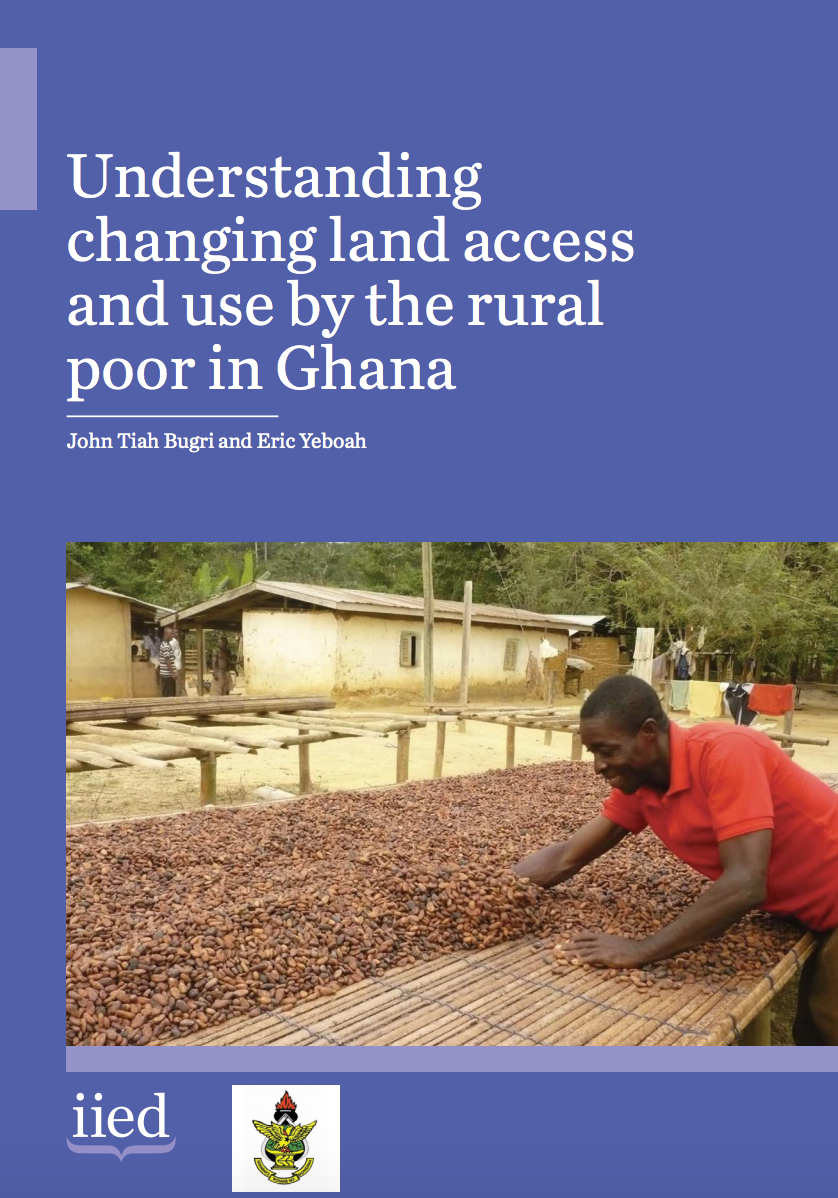Understanding changing land access and use by the rural poor in Ghana
In Ghana 70 per cent of the population are smallholder farmers who depend on the land for their basic needs. Growing competition for this resource is having significant impacts on rural livelihoods and governance as land changes hands. This study highlights the key drivers of pressure on rural land and their communities, such as population growth, urbanisation and acquisition of land by new actors, including government and business.
Agrosilvopastoral Systems in Northern Thailand and Northern Laos: Minority Peoples’ Knowledge versus Government Policy
Traditional agrosilvopastoral systems have been an important component of the farming systems and livelihoods of thousands of ethnic minority people in the uplands of Mainland Southeast Asia. Drawing on a combination of qualitative and participatory inquiries in nine ethnic minority communities, this study emphasizes the complex articulation of local farmers’ knowledge which has been so far excluded from governmental development and conservation policies in the northern uplands of Thailand and Laos.
Perspectives of Livestock Farmers in an Urbanized Environment
Agriculture and its conflicts is a traditional debate in contemporary rural geography, associated with the organization and transformation of cultural landscapes by social groups. One of the most important areas of research is the perspectives and responses of farmers on the urban-rural fringe. The problems associated with land use change and the varying influences on new uses of traditional landscape introduce renovating and permanent elements to the management, responses and perspectives of farmers: extensification, changes in the organization of farm, relocation, etc.
Introduction: The Continued Importance of Smallholders Today
Smallholders remain an important part of human-environment research, particularly in cultural and political ecology, peasant and development studies, and increasingly in land system and sustainability science. This introduction to the edited volume explores land use and livelihood issues among smallholders, in several disciplinary and subfield traditions. Specifically, we provide a short history of smallholder livelihood research in the human-environment tradition.
The Anatomy of Medium-Scale Farm Growth in Zambia: What Are the Implications for the Future of Smallholder Agriculture?
Lost in the debates about the appropriate scale of production to promote agricultural growth in Africa is the rapid expansion of medium-scale farmers. Using Zambia as a case study, this article explores the causes and consequences of this middle-tier transformation on the future of small-scale agriculture. Combining political economic analysis with household survey data, this article examines the relationships between the growth in medium-scale farmers and changing conditions of land access, inequality, and alienation for small-scale farmers.
Agriculture on the Brink: Climate Change, Labor and Smallholder Farming in Botswana
Botswana is a semi-arid, middle-income African country that imports 90 percent of its food. Despite its relative prosperity, Botswana also suffers from one of the highest measures of income inequality in the world, persistent poverty, and relatively high levels of food insecurity. The objective of this paper is to explore how political economy, climate change and livelihood dynamics are synergistically impacting household food security.
Smallholders, Agrarian Reform, and Globalization in the Brazilian Amazon: Cattle versus the Environment
Smallholder farming in the Brazilian Amazon has changed markedly over the last few decades, following a pervasive swing to cattle production observed across the basin. These changes have brought opportunities for accumulating a modicum of wealth that were not available in the early stages of colonization. At the same time, they have reconfigured livelihood systems away from diversified agriculture to a strong engagement with the cattle economy.
Historical Changes of Land Tenure and Land Use Rights in a Local Community: A Case Study in Lao PDR
Land-titling programs, land and forest allocation programs, and projects on state-allocated land for development and investment in Laos have been key drivers of change in land tenure. These have triggered major shifts in land use rights, from customary, to temporary, and then to permanent land use rights. This article explores how government programs to grant land use rights to individual households have affected the way people have been able to acquire and secure land tenure.
Do Smallholder, Mixed Crop-Livestock Livelihoods Encourage Sustainable Agricultural Practices? A Meta-Analysis
As calls for bolstering ecosystem services from croplands have grown more insistent during the past two decades, the search for ways to foster these agriculture-sustaining services has become more urgent. In this context we examine by means of a meta-analysis the argument, proposed by Robert McC. Netting, that small-scale, mixed crop-livestock farming, a common livelihood among poor rural peoples, leads to environmentally sustainable agricultural practices.
Why Don’t More Farmers Go Organic? Using A Stakeholder-Informed Exploratory Agent-Based Model to Represent the Dynamics of Farming Practices in the Philippines
In spite of a growing interest in organic agriculture; there has been relatively little research on why farmers might choose to adopt organic methods, particularly in the developing world. To address this shortcoming, we developed an exploratory agent-based model depicting Philippine smallholder farmer decisions to implement organic techniques in rice paddy systems. Our modeling exercise was novel in its combination of three characteristics: first, agent rules were based on focus group data collected in the system of study. Second, a social network structure was built into the model.
Interdependences between Smallholder Farming and Environmental Management in Rural Malawi: A Case of Agriculture-Induced Environmental Degradation in Malingunde Extension Planning Area (EPA)
The objective of this article was to develop a deeper understanding of the interdependences between smallholder farming and the state of environmental management in rural Malawi. We examined the agricultural local governance framework in Malingunde Extension Planning Area (EPA), its contribution to food security and how it conflicts with overall land and forest resources management. The charcoal production process was discussed in line with its implications for agricultural production and environmental sustainability.



